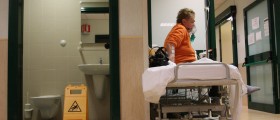
Septicemia or sepsis is a life-threatening medical condition and a complication of an infection that can take place anywhere in the body. Sepsis is nothing but a systemic inflammatory reaction to an infection that has spread to blood. It is more severe in elderly individuals and immunocompromised patients.
Sepsis develops once microorganisms enter the bloodstream and the body starts to synthesize and release various chemicals which fight the infection and at the same time trigger inflammatory reaction. Such reaction among many different events leads to formation of microscopic blood clots that block blood vessels and deprive certain body parts from oxygen and other nutrients. Progression of sepsis leads to septic shock, drop of blood pressure and eventually death.
What Causes Sepsis?
Even though almost all infections in the body may initiate sepsis, the condition is most commonly associated with pneumonia, abdominal infections, kidney infection and bloodstream infection.
It is estimated that sepsis frequently occurs in people over the age of 65 and that in the majority of cases the infective agents are drug-resistant bacteria. The immune system of older individuals is not healthy enough to fight against infections. Similarly, immunocompromised patients are prone to infections in general and are also highly likely to end up with sepsis.
Sepsis Treatment Options
Patients who are diagnosed with sepsis are hospitalized, remain in an intensive care unit and are treated promptly with aggressive approach. If necessary, some of them will have breathing and blood circulation support.
Antibiotics are the cornerstone of sepsis treatment. In order to achieve better effects and act quickly they are administered intravenously. Together with antibiotics patients receive plenty of intravenous fluids. Most commonly, until the infective agent is identified, patients receive potent 'broad spectrum' antibiotics and after the bacteria have been isolated, one starts to receive antibiotic (or a combination of antibiotics) to which the bacteria show sensitivity. The course of antibiotics lasts for 7-10 days.
Furthermore, it is also essential to control the source of sepsis i.e. the wound, abscess or other source of primary infection.
Vasopressors are medications that bring low pressure under control. Patients suffering from sepsis are frequently administered dopamine and noradrenaline. These drugs are also administered intravenously.
Recombinant human activated protein C (rhAPC) is a new medication reserved for patients with severe sepsis capable of reducing inflammatory body reaction. The drug also prevents blood clotting. It is contraindicated in patients with a history of stroke and internal injury.
Prevention of Sepsis
The only way to prevent sepsis is to treat the primary infection adequately and with potent antibiotics. Special attention while treating infections should be paid to elderly and immunocompromised patients. Only by eradicating primary infection and not allowing bacteria to enter the bloodstream sepsis will be successfully prevented.

















Your thoughts on this
Loading...